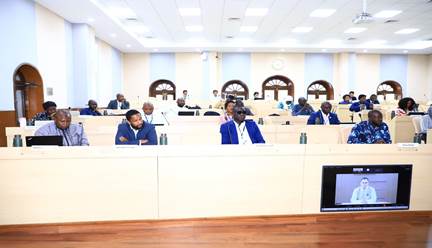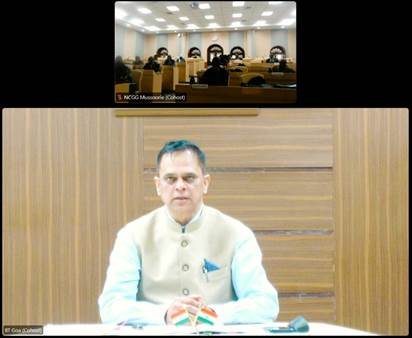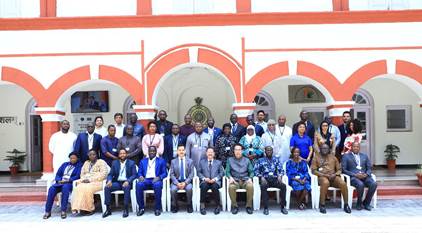Ministry of Personnel, Public Grievances & Pensions
A Two-Week 4th Mid-Career Training Programme for mid-level Civil Servants of Gambia commenced at National Centre for Good Governance, Mussoorie
30 Senior Officers, Including Deputy Permanent Secretaries and Directors, are attending the Mid- Career Training Program
प्रविष्टि तिथि:
27 MAY 2024 3:17PM by PIB Delhi
A Two-week 4th Mid-Career Training Programme for mid-level Civil Servants of Gambia commenced today at National Centre for Good Governance, Mussoorie. The program is being organized from 27th May 2024 to 7th June 2024. The program is being attended by 30 senior officers from Gambia working in capacities as Deputy Permanent Secretary, Deputy Director General, Deputy General, Deputy Youth Advisor to the President, Director, Executive Director, Principal, National Coordinator, Acting Director, among others. All the officers represent ministries such as Ministries of Lands, Regional Government and Religious Affairs, Office of the President State House, Ministry of Transport, Ministry of Finance and Economic Affairs, Ministry of Finance and Economic Affairs, Ministry of Gender, Children and Social Welfare, Ministry of Public Service State House, Ministry of Higher Education Research Science and Technology, Accountant’s General Department, Ministry of Justice, Department of Livestock Service in Gambia among others.

The NCGG, an autonomous institution under the Department of Administrative Reforms and Public Grievances within the Ministry of Personnel, Public Grievances and Pensions, Government of India, is dedicated to action research, studies, and capacity building at both national and international levels. NCGG focuses on strengthening bilateral ties and fostering cooperation with other countries. The capacity building programs organized by NCGG offers a rich cross-country experience and a platform for policy dialogue, sharing best practices in project and risk management across various sectors. This initiative aims to provide officers with valuable insights into project planning and execution, institutional transformation, and enhancing public engagement with the government.
Shri V. Srinivas, Director General of the National Centre for Good Governance (NCGG) and Secretary of the Department of Administrative Reforms and Public Grievances (DARPG), warmly welcomed the participating officers in his inaugural address. He highlighted the transformative Indian governance model, which has evolved significantly from 2014 to 2024. The new paradigm emphasizes transparency, efficiency, and effectiveness, driven by technological advancements that have notably impacted India's rural areas and bridged the digital divide. Entering 'Amrit Kaal,' he quoted Prime Minister Shri Narendra Modi, stating that India is moving towards new strengths and a brighter future. The vision includes improving public grievance mechanisms, implementing good governance models, and adopting advanced technologies. He gave examples of e-secretariats technology advancement contributing to significant positive changes. India's adoption of the e-office system, with 16,000 e-services for citizens exemplifies this transformation. The government now adheres to the principle of "maximum governance, minimum government," aiming to enhance efficiency in public administration. He added.

Shri V. Srinivas, DG (NCGG) and Secretary, (DARPG)
Shri Srinivas underscored the importance of digital literacy for both government officials and citizens to streamline governance processes. Looking ahead to Vision 2047, he outlined plans to empower citizens in sectors such as healthcare and regional development. Shri Srinivas emphasized India's grievance redressal program, which resolves complaints within ten days, as a good replication good governance model for Gambia. In 2024, NCGG aims to organize 60 capacity-building programs for various countries, fostering global cooperation and shared progress. He added.
Dr. AP Singh, Associate Professor and Course Coordinator, provided an insightful overview of the National Centre for Good Governance (NCGG)'s operational framework and notable achievements during the formal introduction session. Further in his address, Dr. Singh elaborated on the specially designed program for participants, covering a comprehensive range of topics.
These include an overview of All India Services, digital public infrastructure as a global public good, Ayushman Bharat Pradhan Mantri Jan Arogya Yojana, land acquisition compensation and rehabilitation, Government e-Marketplace (GeM), Poverty Alleviation in India, and Aadhaar as a tool for good governance and others. Dr. Singh also shared details about the exposure visits organized for the participants, to ITDA Dehradun, Forest Research Institute, Zero Energy Project, Delhi Metro Rail Corporation, Pradhanmantri Sangrahalaya, Bureau of Police Research and Development, and the iconic Taj Mahal. These visits are designed to offer practical insights and firsthand experience of innovative projects and institutions including imparting knowledge about India’s rich history and culture.

It is pertinent to mention that NCGG has trained nearly 150 senior civil servant officers from Gambia under these programs so far. The National Centre for Good Governance (NCGG), in partnership with MEA, has imparted training to civil servants of 17 countries, viz. Bangladesh, Kenya, Tanzania, Tunisia, Seychelles, Gambia, Maldives, Sri Lanka, Afghanistan, Laos, Vietnam, Nepal, Bhutan, Myanmar, Ethiopia, Eritrea, and Cambodia. The capacity building program will be supervised by Dr. A.P Singh, Associate Professor and Course Coordinator, Dr. M.K Bhandari, Associate Course Coordinator & Faculty, NCGG, Shri Sanjay Dutt Pant, Program Assistant NCGG along with Ms. Monisha Bahuguna.
***
PK/PSM
(रिलीज़ आईडी: 2021793)
आगंतुक पटल : 1506